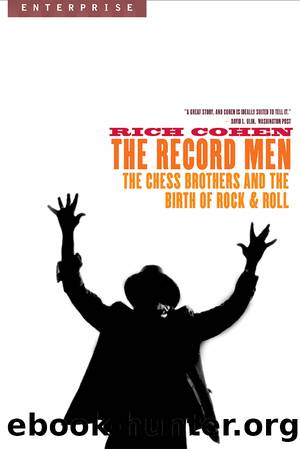The Record Men by Rich Cohen

Author:Rich Cohen
Language: eng
Format: epub
ISBN: 9780393352504
Publisher: W. W. Norton & Company
Published: 2015-08-15T00:00:00+00:00
4
2120 South Michigan
In 1950, Evelyn Aron, who never really liked her partner, who saw him as a graspy, grubbing, scheming, plotting vulgarian and she was right, and that is what made him great, sold out. Leonard was now the sole owner of the label, which, until the end of his career, he would run by fiat. When Phil came over full-time, he did everything Leonard didâsigned bands, produced records, pitched distributorsâin fact, it would never have worked without Phil and the special dynamic of the brothersâ working in combinationâbut Leonard was the big boss, having the same advantages over the majors, with their floors and floors of bureaucracy, that a monarchy has over a democracy. âNormally you have a command structure with a president on top and different departments,â Ron Malo said in I Am the Blues. âChess was a bicycle wheel. Leonard at the hub and everything circling around him. He would fix the toilets himself rather than pay a plumber $6.95 to replace a valve.â
At the suggestion of a record presser named Buster Williams, Leonard changed the name of the company. Aristocrat struck the wrong note for a label recording rough electric Blues. Leonard must have also felt a need to mark his emergence as an independent operator. Chess was the family name, and it also had a nice top-drawer ring. Leonard would eventually form subsidiary labelsâlike the imprints book publishers use to denote different genres: there was Chess, which recorded Blues; Checker, which recorded Pop and Rock and Blues; and Argo, which recorded Jazz and comedy so blue it calls up a spit-take.
In the coming years, Leonard would move the company from office to office, studio to studio, forever working toward self-sufficiency. He was trying to make his independent into a major, a goal he nearly reached at 320 East 21st Street, the labelâs last home. It housed the business office, art department, recording studio, and pressing plant. In one building, Chess could sign and record, press and package and ship its records. But this turned out to be a lesson in unintended consequences. With the presses running, a hum went through the building and into the studio. You can hear it on the songs cut in those years, the building rumbling like an old school.
In the early years, Chess recorded in a series of makeshift studios. Technicians sought to dampen the defects of these rooms (padding walls, covering ducts), but it soon became clear that the defects were creating the sound the critics found so fresh. You can identify the era of a side by the studio where it was cut, the way you can identify a scotch by the keg in which it was aged. In the sessions recorded at 4750 South Cottage Grove, there is an echo that gives the sides a Rockabilly jump. This came to be known as the Chess sound, which the majors spent thousands trying to replicate. It was, in fact, the accidental result of a steel pipe that ran through the studio.
Download
This site does not store any files on its server. We only index and link to content provided by other sites. Please contact the content providers to delete copyright contents if any and email us, we'll remove relevant links or contents immediately.
The Goal (Off-Campus #4) by Elle Kennedy(12454)
Kathy Andrews Collection by Kathy Andrews(10560)
Diary of a Player by Brad Paisley(6872)
What Does This Button Do? by Bruce Dickinson(5537)
Assassin’s Fate by Robin Hobb(5256)
Big Little Lies by Liane Moriarty(4894)
Pale Blue Dot by Carl Sagan(4019)
Sticky Fingers by Joe Hagan(3459)
The Heroin Diaries by Nikki Sixx(2943)
The Death of the Heart by Elizabeth Bowen(2911)
Beneath These Shadows by Meghan March(2731)
The Help by Kathryn Stockett(2711)
Confessions of a Video Vixen by Karrine Steffans(2685)
How Music Works by David Byrne(2540)
Jam by Jam (epub)(2497)
Harry Potter 4 - Harry Potter and The Goblet of Fire by J.K.Rowling(2422)
Strange Fascination: David Bowie: The Definitive Story by David Buckley(2371)
Petty: The Biography by Warren Zanes(2241)
Darker Than the Deepest Sea by Trevor Dann(2214)
